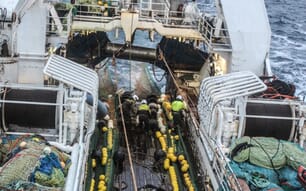The Marine Conservation Society (MCS) announced yesterday that it had downgraded the status of the fish after a fall in stock numbers.
However, the Scottish Fishermen's Federation (SSF) insisted that haddock quotas had been set according to stock assessments and the MCS had fundamentally misunderstood the science.
SFF chief executive Bertie Armstrong said: “The MCS has completely misunderstood the position as far as haddock stocks are concerned and should withdraw its utterly misleading comments.
“The organisation is trying to alter consumer behaviour on completely false premises and should desist at once.
“Fish stocks are sustainable when the amount of fish caught is below the maximum sustainable yield (MSY).
“For haddock that has been the case since 2007 – and only last year advice from fisheries scientists at the International Council for the Exploration of the Seas (ICES) was for an increase in the catch of 30%.
“They then discovered that there had been an error in their assessments, corrected the statistical model and recommended a reduction in the catch of 45%, which was adopted.
“As a result, the fishery continues to be managed at sustainable levels, and the spawning stock for haddock will increase significantly next year.”
However, the MCS believes that the downgrade of the species in three North Sea and West of Scotland fisheries is justified due to declining stocks in these areas.
Bernadette Clarke, manager of the MCS Good Fish Guide, said: "These ratings changes have come about because scientific perception of the stock has changed.
"Compared to 2015, the stock numbers in 2016 were below the recommended level and at the point where action is now needed to increase the number of fish of breeding age."
Haddock – along with salmon, cod, tuna and prawns – is among the top five seafood species consumed in the UK, and is particularly popular in Scottish chip shops.
"Consumers can be re-assured that quotas for haddock have already been reduced in line with the stock assessments, following an unfortunate error by the scientists. So you can continue to buy your fish supper without worrying about whether there will be enough fish left in the sea," Armstrong added.


